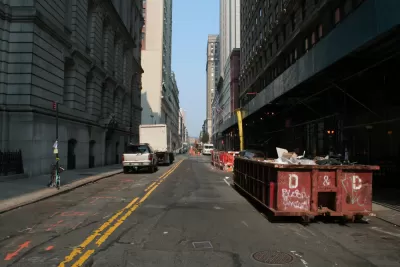The de Blasio Administration has recommended that the city of New York is ready to collect its trash in a new way, with a system known as franchising.

David Giambusso reports that New York City will "begin implementing a 'zoned-collection' system for the city's private carting industry…" According to Giambusso, the change represents "an historic change in how commercial waste is collected and managed in New York City."
In a report that's scheduled to be released Wednesday, the de Blasio administration will argue a zoned-collection system, known elsewhere as 'franchising,' will dramatically reduce vehicle emissions while also giving the city much greater regulatory authority over an industry critics have likened to the wild west.
The New York State Department of Sanitation collects all residential waste in the city, but private contractors collect waste from "virtually all of the waste collected from businesses, both large and small," explains Giambusso. The private trash collectors are heavily criticized by labor and environmental groups, however, leading to the de Blasio Administration's actions.
Zone collection essentially means the city will be divided into zones and contractors will be allowed to bid on specific sectors. Now, a single city block can be serviced by more than a dozen different companies, leading to inefficient routes, excessive pollution and traffic.
The report expects that efficiencies gained from a zoned system will also drive down trash collection prices.
It could take "two years for the city to develop a plan and another three years or more to implement it," reports Giambusso, and "the City Council will have to pass legislation to codify the changes."

Planetizen Federal Action Tracker
A weekly monitor of how Trump’s orders and actions are impacting planners and planning in America.

Congressman Proposes Bill to Rename DC Metro “Trump Train”
The Make Autorail Great Again Act would withhold federal funding to the system until the Washington Metropolitan Area Transit Authority (WMATA), rebrands as the Washington Metropolitan Authority for Greater Access (WMAGA).

DARTSpace Platform Streamlines Dallas TOD Application Process
The Dallas transit agency hopes a shorter permitting timeline will boost transit-oriented development around rail stations.

San Francisco's School District Spent $105M To Build Affordable Housing for Teachers — And That's Just the Beginning
SFUSD joins a growing list of school districts using their land holdings to address housing affordability challenges faced by their own employees.

Car-Centric LA Suburb Looks to a Train-Oriented Future
City leaders in Rancho Cucamonga, the future western terminus of the Brightline West rail line to Las Vegas, want to reimagine the city as a transit-oriented, pedestrian-friendly community.

New Alaska Bitcoin Mine Would Burn as Much Energy as the State’s Largest Coal Plant
Fueled by “stranded” natural gas, the startup hopes to become the largest in the US, and to make Alaska an industry center.
Urban Design for Planners 1: Software Tools
This six-course series explores essential urban design concepts using open source software and equips planners with the tools they need to participate fully in the urban design process.
Planning for Universal Design
Learn the tools for implementing Universal Design in planning regulations.
Municipality of Princeton
Roanoke Valley-Alleghany Regional Commission
City of Mt Shasta
City of Camden Redevelopment Agency
City of Astoria
Transportation Research & Education Center (TREC) at Portland State University
US High Speed Rail Association
City of Camden Redevelopment Agency
Municipality of Princeton (NJ)





























